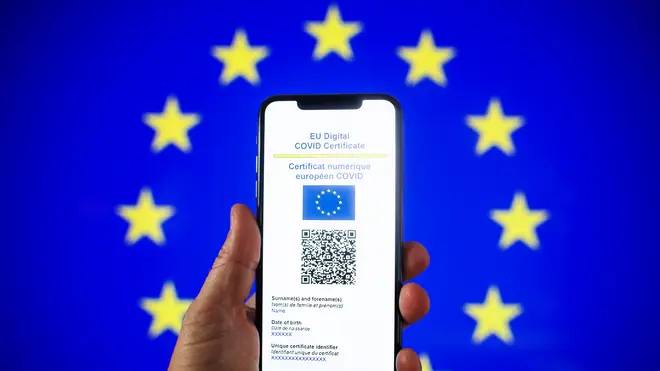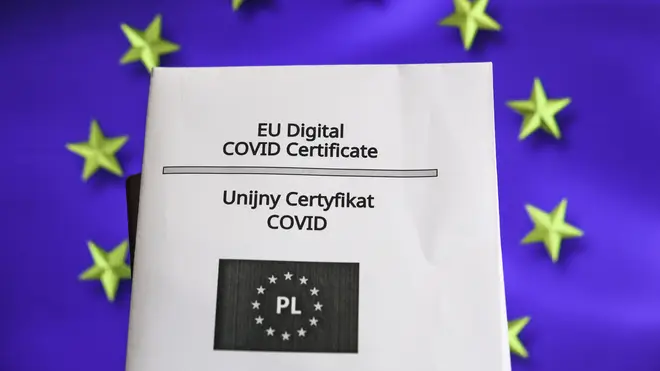
Clive Bull 1am - 4am
2 July 2021, 10:39 | Updated: 2 July 2021, 11:38

The EU officially rolled out its Digital Covid Certificate yesterday – but what is it, and what does it mean for British travellers?
The EU Digital Covid Certificate is the EU’s vaccine passport. It is a way for EU citizens to prove that they have either been vaccinated against Covid-19, received a negative test result or have already had Covid-19.
It is recognised in all EU member states, as well as Switzerland, Iceland, Norway and Liechtenstein. Anyone legally living in these countries, regardless of whether or not they are an EU national, can get one.
Read more: Boris Johnson to meet Angela Merkel for talks on Covid travel rules
Read more: Covid-19: WHO warns of new wave in Europe unless people 'remain disciplined'
The European Commission’s webpage says the holders of the pass “should in principle be exempted from free movement restrictions” and that member states should “refrain from imposing additional travel restrictions on the holders of an EU Digital Covid Certificate, unless they are necessary and proportionate to safeguard public health” - for example, in response to the emergence of new variants of concern.
It means that fully-vaccinated people and people who have recovered from Covid-19 should be exempt from travel-related testing or quarantine. People with a negative test are also exempt as long as they are not coming from a “heavily affected” area.
A person is counted as fully-vaccinated 14 days after receiving a second dose of an EU-approved jab.

Travel expert demands UK adopt EU-wide covid passport
The certificate is a QR code that contains an individual’s vaccine information. EU nationals can either download it on their phone or obtain a paper copy free of charge.
They are issued by national authorities, such as test centres or health authorities.
The European Commission website says that, in order to waive free movement restrictions, the individual must have had a vaccine which has received EU marketing authorisation.
The EMA approved vaccines are Pfizer-BioNTech, Moderna, Johnson & Johnson, and Oxford-AstraZeneca jabs manufactured in the UK or Europe.
However member states have the flexibility to decide to include other vaccines given to EU travellers.

It was officially introduced on Thursday 1 July, with a six-week “phase in” period.
However, some EU countries were already using it voluntarily.
Read more: Boris Johnson says he wants life to return to ‘as close to it was before Covid’
Read more: Schools could open vaccination clinics for teens, SAGE member suggests
If you are an EU national who was vaccinated in the UK, whether or not you are able to get the EU Digital Covid Certificate depends on your home country.
UK nationals living in the UK cannot get an EU Digital Covid Certificate because the UK is not an EU member state.
However the EU has said it is working to align its Covid certification with equivalents in non-EU countries.
In the UK, that would be the NHS Covid Pass. The Pass, which can be accessed via the existing NHS app, also shows proof of vaccination, a negative test or recovery from Covid-19. Like the EU Digital Covid Certificate, it is also available on mobile devices or on paper.

PM says double jabs to be a 'liberator' for international travel
Currently, the EU as a whole does not recognise the NHS Covid Pass, but some individual EU countries do. Greece, Spain and Malta, for example, are already accepting it.
There are concerns, however, that British travellers may be dealt another blow if the EU does not accept vaccine certification from people who received the AstraZeneca jab if it was manufactured at the Serum Institute of India, because this particular vaccine is yet to be approved by the EU. However, as the vaccine is identical to Europe-made AstraZeneca jabs, there are hopes that this could change.